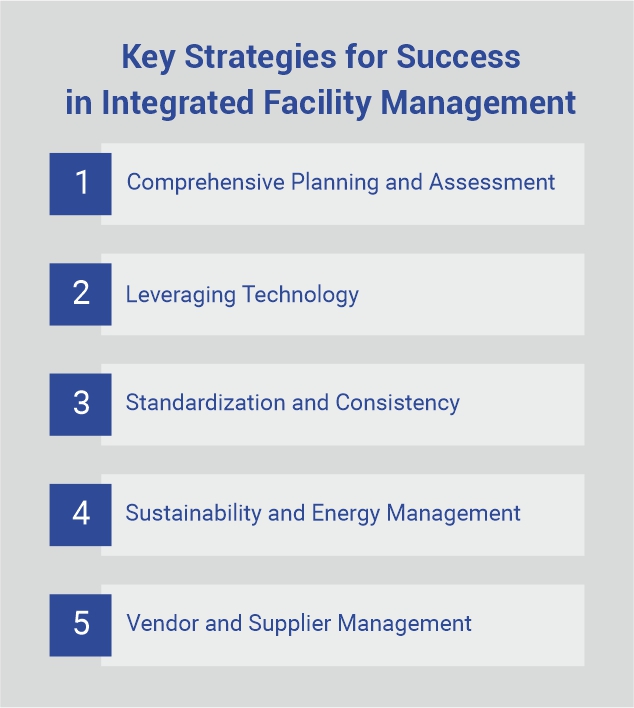Key Strategies for Success
Integrated Facility Management (IFM) has become a pivotal approach in managing complex facilities efficiently and effectively. Combining multiple service streams under a single management umbrella allows organizations to streamline operations, reduce costs, and improve overall service quality. Here, we explore the best practices for effective IFM, key strategies for success, and the crucial role of communication and collaboration.

Understanding Integrated Facility Management
Integrated Facility Management (IFM) is a comprehensive approach that consolidates multiple facility services under a single management umbrella, streamlining operations and improving efficiency. By unifying various functions such as mechanized cleaning, maintenance, security, horticulture landscaping, paste control and more, IFM enables organizations to achieve consistent service standards, reduce operational redundancies, and optimize resource utilization. This holistic management strategy leverages advanced technologies, standardized procedures, and sustainable practices to ensure seamless facility operations. Through such an integrated approach, IFM not only meets immediate facility needs but also supports long-term organizational goals and sustainability initiatives.
Key Strategies for Success in Integrated Facility Management
1. Comprehensive Planning and Assessment
A thorough assessment of the facility’s needs and a comprehensive planning phase are fundamental to successful IFM. This includes:
Needs Analysis:
Conducting a detailed needs analysis to understand the specific requirements of the facility. This involves evaluating current services, identifying gaps, and setting clear objectives for improvement.
Resource Allocation:
Allocating resources efficiently to meet the identified needs. This includes manpower, equipment, and financial resources.
Risk Management:
Identifying potential risks and developing strategies to mitigate them. This ensures smooth operations and minimizes disruptions.
2. Leveraging Technology
The integration of advanced technology is crucial for modern IFM. Key technological tools include:
Mechanized Cleaning Machines:
IoT and Automation:
Implementing Internet of Things (IoT) devices and automation systems to enhance real-time monitoring, predictive maintenance, and energy management.
Data Analytics:
Harnessing data analytics to gain insights into facility operations, track performance metrics, and make data-driven decisions.
3. Standardization and Consistency
Establishing standardized procedures and ensuring consistency across all service areas is vital. This includes:
Standard Operating Procedures (SOPs):
Developing and implementing SOPs for all facility management services to ensure uniformity and efficiency.
Training and Development:
Providing regular training to staff to maintain high standards of service and stay updated with the latest industry practices.
Quality Control:
Implementing rigorous quality control measures to monitor and maintain service standards.
4. Sustainability and Energy Management
Incorporating sustainability practices into IFM not only reduces environmental impact but also leads to cost savings. Key practices include:
Energy Efficiency:
Implementing energy-efficient systems and practices, such as LED lighting, energy management systems, and regular energy audits.
Waste Management:
Adopting effective waste management strategies, including recycling programs and waste reduction initiatives.
Sustainable Sourcing:
Using environmentally friendly products and services, and working with suppliers who adhere to sustainable practices.
5. Vendor and Supplier Management
Effective management of vendors and suppliers is critical for ensuring reliable and high-quality service delivery. This involves:
Vendor Selection:
Choosing vendors based on their reliability, quality of service, and adherence to sustainability practices.
Contract Management:
Establishing clear contracts with defined service level agreements (SLAs) to ensure accountability and performance.
Relationship Management:
Building strong relationships with vendors to ensure collaboration and timely resolution of issues.
Importance of Communication and Collaboration
Effective communication and collaboration are cornerstones of successful Integrated Facility Management. They foster a cohesive working environment, enhance problem-solving, and ensure that all stakeholders are aligned towards common goals.
1. Clear Communication Channels
Establishing clear communication channels is essential for efficient IFM. This includes:
Internal Communication:
Ensuring seamless communication among the facility management service provider through regular meetings, updates, and the use of communication tools.
External Communication:
Maintaining open lines of communication with clients, vendors, and other stakeholders to address concerns, provide updates, and gather feedback.
2. Collaboration and Teamwork
Promoting collaboration and teamwork within the facility management team enhances efficiency and service quality. Key practices include:
Cross-functional Teams:
Forming cross-functional teams to address complex issues and foster a collaborative approach to problem-solving.
Team Building Activities:
Organizing team-building activities to strengthen relationships and improve teamwork.
Shared Goals:
Setting shared goals and objectives to ensure all team members are aligned and working towards common targets.
3. Stakeholder Engagement
Engaging stakeholders effectively is crucial for the success of IFM. This involves:
Client Engagement:
Regularly engaging with clients to understand their needs, gather feedback, and ensure satisfaction with the services provided.
Employee Engagement:
Involving employees in decision-making processes, providing growth opportunities, and recognizing their contributions to foster a motivated and committed workforce.
Community Engagement:
Building positive relationships with the surrounding community through corporate social responsibility (CSR) initiatives and community outreach programs.
Conclusion
Effective Integrated Facility Management requires a strategic approach, leveraging technology, standardizing processes, and prioritizing sustainability. However, the key to true success lies in robust communication and collaboration. By fostering an environment of open communication, teamwork, and stakeholder engagement, organizations can achieve seamless operations, enhanced service quality, and long-term sustainability. Incorporating these best practices and strategies ensures that Integrated Facility Management not only meets the immediate needs of the facility but also supports its long-term goals, contributing to the overall success and efficiency of the organization.
With a robust presence spanning over 350+ locations in 20 states, FFServices delivers comprehensive solutions tailored to the unique needs of diverse clients, covering an expansive 80+ million square feet. Our commitment to leveraging advanced technology, adhering to the highest standards, and fostering open communication ensures that our clients receive unparalleled service quality. By integrating multiple facility services under one cohesive management system, FFServices enhances operational performance and sustainability, making us the trusted partner for businesses seeking exceptional facility management solutions.
Contact us for your tailor-made IFM requirements.
Industries we serve:
Automobile | Manufacturing | Pharmaceutical | Oil and Gas | Healthcare | Ancillary | FMCG | Education | Real Estate | Commercial | Mining | Hotels
Also read: 10 Essential Considerations Before Hiring a Facilities Management Company

